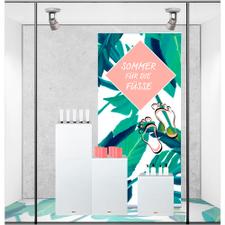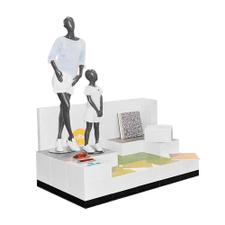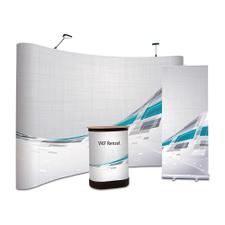Opening a Pop-up Store: Helpful Tips for Getting Started
26.09.2023
In recent years, pop-up stores have become a popular trend in retail. They offer retailers and brands a creative and innovative way to create temporary and unique shopping environments. With the help of pop-up stores, products can be presented without committing to a shop space in the long term.
This flexible business model also catches the eye of many retailers due to its low costs and high potential for attention. Find out here how you too can open your pop-up store and use it for your own benefit.
Table of Contents
↓ What is a pop-up store and what advantages does it bring?
↓ Shop categories on the subject of pop-up stores
↓ Why should you open a pop-up store?
↓ 6 steps: to a successful opening
↓ What are the costs for a pop-up store?
↓ Concept ideas for a pop-up store
↓ Conclusion
↓ Frequently asked questions at a glance
What is a pop-up store and what are its advantages?
A pop-up shop is a temporary retail outlet that opens for a limited period of time - typically a few days, weeks or months. Pop-up stores are characterised by their short operating time, their unconventional locations and their special design and atmosphere. They can be set up in various locations, including vacant shops, galleries, event locations, shopping centres or even on the street. They are often designed in a very creative and eye-catching way to attract attention and attract customers.
Do you want to start a business and test your business concept? A pop-up store can be the ideal solution for you. It allows you to immerse yourself in the entrepreneurial world without making a long-term commitment. The attractive features of pop-up stores are the low rental costs for the premises, short-term leases and, above all, the opportunity to make many sales in just a short time.
Pop-up stores are also known for offering limited editions of products that are only available there. This creates a special sense of urgency with the customer, encouraging them to visit the store and make a purchase decision before it is too late.
Overall, pop-up stores are a creative way for retailers to promote their brand, attract new customers and showcase their products in a unique and exciting environment.
Shop categories on the subject of pop-up stores
Why should you open a pop-up store?
Pop-up stores offer a good opportunity to respond to seasonal needs and to sell at a time when demand is especially high. A pop-up store also gives you the chance to showcase your products in a cost-effective manner and attract new customers.
It is important that your store offers a unique and extraordinary sales experience, because this is the only way your brand will get enough attention and remain in the customers' memory.
Pop-up stores are often used to see if the location attracts enough customers and how the supply and demand principle develops at this stage.
A pop-up store can be a great way to showcase a new product line or product and test demand before producing it in large quantities.
By opening a pop-up store in a busy location, companies and brands can increase their visibility and awareness and attract attention. They offer businesses the opportunity to create unique and engaging customer experiences that can attract and delight customers.
They also offer businesses a flexible way to showcase their products in different locations without having to sign long-term leases or high rents. A pop-up store can also help sell excess stock or seasonal products.
In summary, a pop-up store offers a variety of benefits for businesses and brands, including creating awareness and brand recognition, testing new products and creating engaging customer experiences.
6 steps: to a successful opening
To open a successful pop-up store, there are some important steps to consider. You should consider these challenges in advance to start smoothly and successfully. Read the tips and tricks listed below for a successful opening.
It should be considered, in advance, which goals you want to pursue in order to benefit from the pop-up ideas. Accordingly, the customer experience should be exceptional. No matter what you want to sell, your product should not be your only focus. First and foremost, it's about what you want customers to experience.
Coming back to the objectives, you should be aware of what you want to achieve with the pop-up store. Do you want more attention for your brand or are you simply looking for maximum sales and attracting new customers?
How do you want customers to feel in the shop?
What can you use to encourage your customers to make a purchase?
What makes your shop different from others?
Once your concept has been worked out, it is important to keep an eye on your schedule and budget to create a stable foundation for the rest of your task.
There are three ways to find a location. Either you look for suitable premises on your own, you are helped by online platforms where you can also compare directly with other properties or you hire an estate agent to look for you.
The following questions might make your search a little easier:
Where would you like to open the pop-up store?
Which location suits me and my store?
Which city or neighbourhood makes the most sense?
Do you rely on walk-in customers?
How big should the store be?
Does it need to have space outside? Or will sales only take place indoors?
What feeling should the premises convey to your customers?
In order to open your business, you must register it as a standing trade at the public order office. All you need is an official identification document and you will then receive a trade licence. If you decide to close your business, you must deregister it accordingly.
Depending on the legal form you choose, an entry in the commercial register is required. In order to be able to guarantee your employees statutory accident insurance, you need to be a member of a professional association. If you want to offer alcohol and/or food, make sure you know which separate permits are required.
Last but not least, you must observe the hygiene regulations if you want to work with food in general.
These laws, rules and regualtions can differ depending on the country or state you are living in. Check with your local public order office to see which documents are required.
After you have laid a foundation, thought should be given to marketing, which does not have to be expensive. Creativity attracts attention.
Some ideas would be, for example:
Cooperations with bloggers from the region
Posts, stories and reels on your Instagram account
Guerrilla marketing: posters on shop windows that catch the eye of passers-by with their unusual design
Seize every opportunity to live out your creativity. Even a simple conversation with others about your plans can help. Through word-of-mouth, you can make new contacts and may even find support.
To ensure that everything runs smoothly, personnel and payments are among the most important points in the sales process.
Staff
If you need staff for your business, temporary workers can also be a good choice. You can either find someone from your circle of acquaintances, contact the employment offices or search on platforms that offer workers for support.
Payment
In our digitalised world, there are many payment possibilites and services that can be beneficial.
Time is particularly important in a pop-up store. Since the model of a pop-up store is based on speed and simplicity, a simple iPad POS system is recommended.
This system works via the tablet/iPad and saves the vendors a lot of time and money. The biggest advantage is the ease of use: anyone can start immediately without long training periods.
To successfully launch your pop-up store, the opening is an important moment. On this day, you should do everything you can to appeal to as many customers as possible and leave a lasting impression.
An opening party can help, special offers and exclusive promotions attract customers. This will also allow you to address as many customers as possible and leave a lasting impression.
Everyone enjoys special and exclusive offers - offer exactly that to your customers, e.g.: with a photo booth in connection to social media to be linked there and be able to advertise.
Cooperation with a catering service or DJ can also be beneficial and save costs. Both parties will benefit. Not only will you reach more customers, you will also save costs because they will then be shared accordingly.
Last but not least, don't forget to put everything in writing so that the cooperation runs smoothly and enables future collaboration.
What are the Costs for a Pop-up Store?
The cost of a pop-up store can vary depending on location, size, duration and equipment. However, you should keep in mind some costly factors, namely, rent, equipment, staff, insurance and marketing. A rough estimate of the costs could range from a few hundred to several thousand euros per month.
The main costs for a pop-up shop include rent and utilities for the shop space. Rental prices can vary greatly depending on the location and duration of the pop-up store. Popular shopping districts or busy city centre areas may have higher rental costs than less frequented areas. The duration of the pop-up store can also affect costs, as longer-term leases usually allow for lower rental rates.
In addition, there may be costs for setting up the shop. This includes the design and decoration of the shop, the purchase of shelves, furniture, lighting and other equipment. These costs depend on the individual requirements of the pop-up store and can vary depending on the business model and design ideas.
Other cost factors include storage and logistics. If the pop-up store stores goods on site, there are costs for renting storage space and managing inventory. In addition, transport costs may be incurred for transporting goods to and from the pop-up store. Marketing and advertising costs also need to be considered. To publicise the pop-up store, promotional activities such as advertisements, flyers, posters or online advertising may need to be carried out. These costs may vary depending on the marketing strategy chosen.
Finally, staffing and operating costs should also be considered. Employing staff to manage the pop-up store may incur personnel costs. In addition, there may be operating costs such as electricity, water, insurance and waste disposal. It is important to note that the exact costs of a pop-up store depend heavily on individual circumstances. Careful planning and budgeting are crucial to keep costs in check and maximise the success of the temporary retail shop.
Concept Ideas for a Pop-up Store
Fashion and Accessories
Health and Beauty
Arts and Crafts
Food and Beverages
Technology und Gadgets
Travel and Adventure
Music and Entertainment
Books and Stationery
Conclusion
Pop-up stores are an interesting option for reaching new target groups, testing products and realising temporary brand presences. Due to their special design and the limited time period, they generate exclusivity and curiosity among customers.
However, careful planning and implementation is necessary to achieve a positive effect and increase sales. The choice of location, target group approach and store design should be well thought out. In addition, cost-benefit considerations must be made to ensure that the investment is worthwhile.
Ultimately, pop-up stores offer exciting opportunities for brand promotion and customer acquisition - but only with careful planning and evaluation can desired results be achieved.
Frequently asked questions at a glance
Pop-up stores are a popular marketing strategy to attract attention, pique customers' interest and take advantage of a short-term sales opportunity. They can be used by established brands, start-ups or online retailers to showcase their products or services, reach new target groups or convey a specific message.
A pop-up shop, also known as a temporary retail or temporary shop, is a temporary physical retail space often set up in high-traffic areas or unusual locations. Unlike traditional retail shops, pop-up stores are only open for a limited period of time, often for a few days, weeks or months.
Planning a pop-up store requires careful preparation and organisation. Thought should be given to the objective, the target group, the location, the budget, the schedule and many other points, as these contribute to the planning of a pop-up store.




